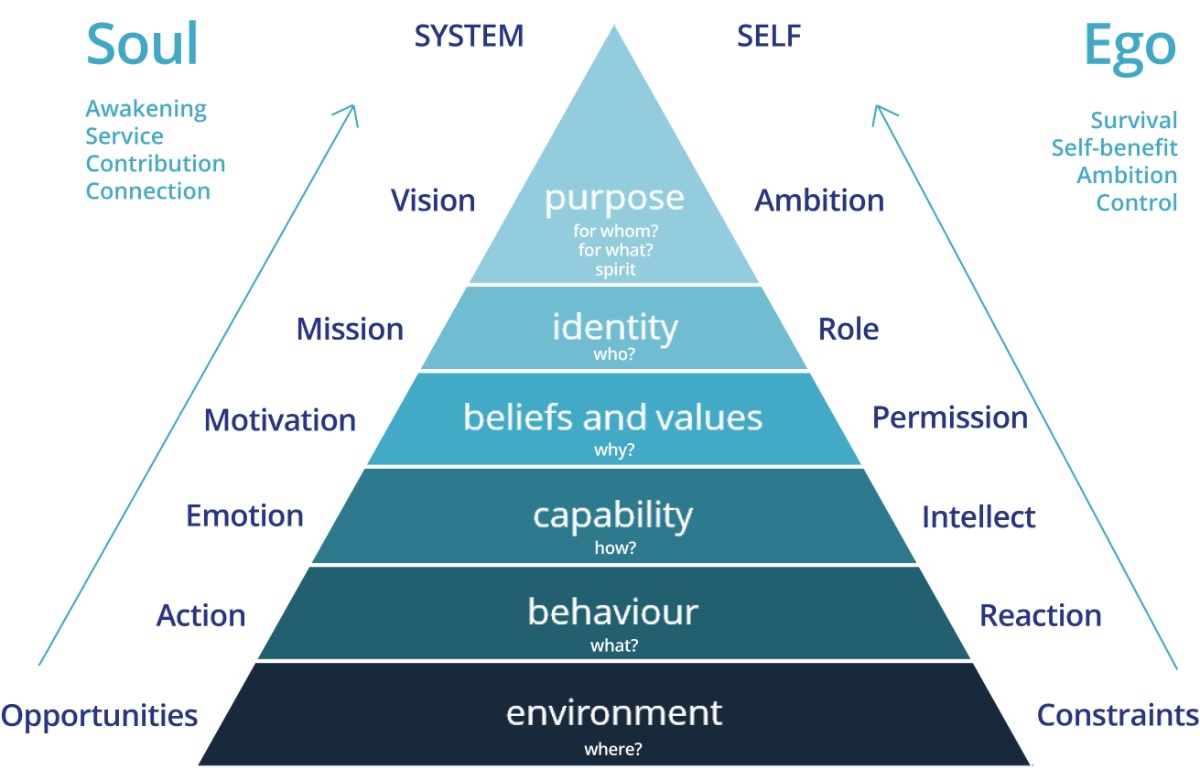23 June 2020: Balancing the ego and souls of organisations
‘Ego’ and ‘Soul’ aren’t words that you would often associate with an organisation.
Yet, when we look at the imbalances that often exist in organisations – aspects like wealth distribution, power, engagement and working conditions, it feels to me that the overall balance needs to shift. And that’s when ‘Ego’ and ‘Soul’ become much more relevant.
Let me tell you why, and what we mean by these two powerful words.
As individuals, we are whole and independent beings – this part of our existence is referred to as our ego.
We are also part of systems that are bigger than us – our families, professions, and the communities we live in – and we refer to this part of our existence as our soul.
Through the Extended Logical Levels model below, you can see how the ego and soul are expressed at each of the levels in which we experience our world.

A quick reminder about terminology
Now, a quick word of warning. It’s quite easy to look at each side of the diagram and apply judgements that ego is ‘bad’ or ‘essential’ or ‘…………….‘ (I’ll leave you to fill in blanks) and that soul is ‘good’ or ‘flaky’ or ‘……………. ‘. These judgements are derived from our beliefs and values, and neither is right or wrong, good or bad.
The key, as we explored in my last blog, is the need to balance and align ego and soul.

Photo credit: Quang Nguyen Vinh
When they are not in balance (for example: our ambition is not aligned with our vision and mission), we often feel struggle or conflict.
When the ego is in balance with the soul, we are far more likely to perform at our best. We are at our most powerful when our vision, ambition, mission and role are aligned.
Soul and ego within organisations
The same is true in organisations – the dynamics of ego and soul operate in the same way.
A company is an entity (ego), comprised of the owners and shareholders whose focus is that the company remains viable and provides a return on investment. This is linked to the ambition of the organisation, including profit forecasts, growth and acquisition plans; and the roles, status and performance expectations of those in charge.

Photo credit: Isaac Smith
At the same time, it’s part of something bigger than itself (soul). During the current pandemic, this has come into sharp focus as we can see how connected companies are with each other, with their communities, with the global financial systems and the climate. The soul is the broader value that the organisation provides to its customers and the larger social and physical environment within which it operates. Employees operate in the space between these two.
In both individuals and organisations, balance is the key.
Lean too far in either direction, and it can have serious consequences.
It can be argued that the 2008 global economic crisis was partly due to too much ego and not enough soul in many financial organisations – ego without soul can lead to blind ambition. Meanwhile, soul without ego can lead to impotence and burnout.
So, what of the current situation and how are organisations responding?
The McKinsey article ’Reimagining the post-pandemic organisation’ (15 May 2020), gives us hope in how some organisations are shifting the balance.
“Amid the fear and uncertainty, people are energised [capability] as companies make good on purpose statements [purpose], eliminate bureaucracy [behaviour, values and beliefs], empower previously untested leaders [behaviour, capability, values and beliefs].”
Organisations felt too bureaucratic, too insular, too inflexible, too slow, too complicated and often more focused on profit [ego] than on people [soul].”
The article asks, “How can leaders accelerate their company’s journeys towards becoming not only faster, but also better for customers, employees and society at large?” Now, that’s a swing to soul if ever I read one!

Photo credit: Roman Kraft
The authors propose that post-pandemic organisations will take shape along three dimensions:
- Who we are: purpose, values, culture
- How we operate: decisions, talents, structures
- How we grow: ecosystems, learning, platforms
Again, we can clearly see these elements in our logical levels model.
‘Who we are’ encompasses both purpose and identity – to thrive, organisations must balance self-protection and making money (ambition) with their contribution to the customers and the larger ecosystem (vision).
This is reflected in a quote from Alain Bejjani (CEO of Majid Al Futtaim (MAF), a Dubai-based conglomerate, who says:
“Some organisations have traded their long-term sustainability for short-term outcomes. When a crisis such as COVID-19 strikes, if you have a strong culture and a shared sense of purpose that your leaders role model every day, you can weather the storm better than most.”
In the turmoil and uncertainty most organisations are operating in today, do they have time to consider their purpose?

Photo credit: Jordan Madrid
I would argue if they are to survive, they must make the time.
An important starting point in achieving success is for key leaders in the business to reflect on their own vision, mission, ambition and role.
Here are some key questions that you might like to explore – try to keep your answers to each question to ten words or less:
- Vision: what do I want to create in the world through me that is beyond me?
- Mission: what is my unique contribution to bring that vision into expression?
- Ambition: what type of life do I want to create for myself?
- Role: what type of person do I need to be in order to create the life I want?
As individuals, our highest performance occurs when each of these dimensions is balanced, aligned, and integrated.

Photo credit: Tobias Bjorkli
At an organisational level, take time as a leadership team to review the following key questions:
- Vision: what do you want to create for your customers through your business? What services, benefits and contributions does your business make to customers, society, the environment?
- Mission: what is your contribution and service (as a team) with respect to the vision for your customers? What are the special resources, capabilities and actions that you have or will develop, apply and mobilise to reach the vision for your customers?
- Ambition: what status and level of achievements do you want your organisation to reach? How do you want your business to be viewed by investors stakeholders and competitors?
- Role: what type of team are you or do you need to be in order to reach the status and level of performance you want to achieve?
I hope the current situation provides the perfect platform for organisations to redress the imbalance between their ego and their soul.
Until next time, please stay safe.
Hilary Barnett, co-founder and coach, Logical Levels Inventory (lli)

